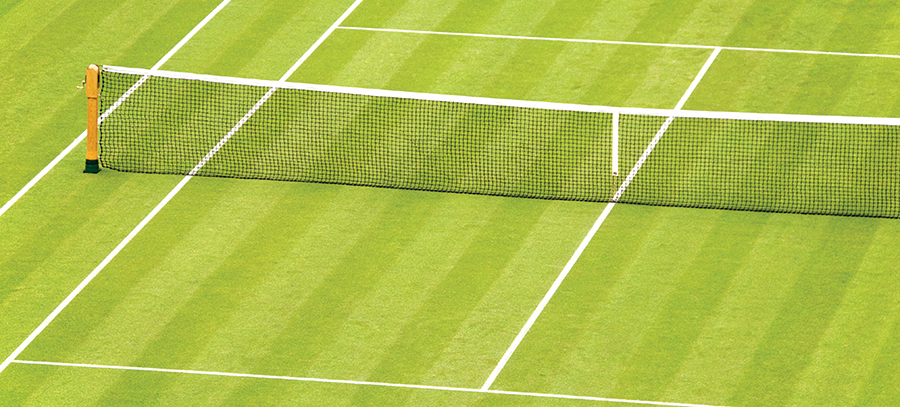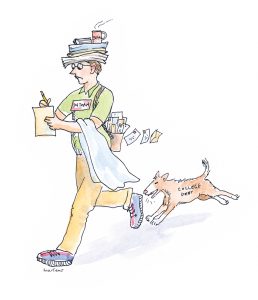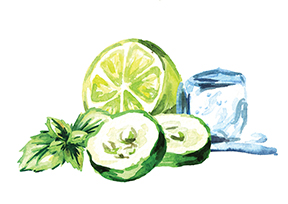
Poetry in Motion
Or, the metamorphosis of a childhood dream
By Maria Johnson
WIMBLEDON — This is not what I imagined: First, it’s not rainy. Or broiling, as it has been in Europe for the past few weeks. It’s perfect weather, which makes the day all the more astounding. I finally made it to Wimbledon, though not in the way I dreamed about, when I first started sleeping with a pro.
Pro Staff, that is. It was a Wilson wood racquet, lacquered black and white, with nylon string, candy-striped by threads of red and blue. My mom bought it at Value Village near our neighborhood pool, which had three hard-surface tennis courts tacked on. Tennis was an afterthought, but there was a decent pro and a free clinic for kids. So I went.
It was the Seventies, and the great American tennis boom was, well, booming. Chris Evert was a be-ribboned, two-fisted metronome. Her boyfriend and, for a while fiancé, Jimmy Connors, wore a Buster Brown haircut, shorty shorts and swung a steely T-2000 racquet.
Then there were B&B. Bjorn and Billie Jean. The slap shot Swede and the rhinestoned conquerer of Bobby Riggs. The sport also served up John McEnroe, who picked volleys out of his shoestrings, and the freshly defected Martina Navratilova, who feasted on Twinkies and — when she had her head together — top 10 players.
It was a glorious time to find tennis.
And that’s what it felt like — a discovery of immense importance. Here was a sport that offered personalities, drama, romance, tons of TV coverage, and most of all, for me personally, an irresistible feeling.
I remember the first time I connected, really connected with a forehand. A bunch of us kids in the free clinic were lined up on the service line, starched into ready position, racquets pointing straight ahead at 12 o’clock. The pro tossed us a ball. We would take the racquet back to 6 o’clock, step and hit on the first bounce.
I socked the ball into the fence. It hit the sweet spot. Sweet Jesus.
The vibration traveled from ash, to arm, to all of the addictive juices an 11-year-old brain could offer. I was flat hooked.
From then on, I lived on court, rubbing blisters, practicing tosses under the midday sun, and generally redirecting my neighborhood-baseball arm into a serve and volley arm. I devoured Tennis to Win, by Billie Jean King, who started playing at exactly the same age I did. If this fireman’s daughter from Long Beach, California could make it to the pros, why couldn’t I?
I made a sign that said “Think Wimbledon.” I taped it to the ceiling above my bed. It was the first thing I saw in the morning and the last star I wished on at night. Certainly, if I repeated it enough, believed it enough, envisioned it enough, I would get to the high altar of tennis
Which I did, eventually.
After a decent high school playing career, I hung up my racquet for 20 years until our boys were small and we joined a neighborhood swimming pool with some tennis courts tacked on. At the urging of a friend, I took a lesson with the pro. The pro put me on a club team, and that’s how the second act of my tennis life started.
The sport looks so much different from this station in life.
Absent the blinders of youth, and the ridiculous pressure I put myself under as a kid, I see that practice never makes perfect. At best, practice — or THE practice — of any game or craft gives you perspective to see that game itself is the teacher.
And so you learn that some shots are winners and some are stinkers.
That the difference between winning and losing is hitting just a few more winners.
That the secret to hitting a few more winners is to let it happen.
And that letting it happen means you might not get what you wanted — or you might — just not the way you thought you would.
The grass is so green here. It’s mowed in vertical stripes, just like on TV. I can see so much better, in person, how the ball barely comes up off the surface.
I can see the ball boys and girls running with precision, bowling the yellow felt balls to each other around the edges. They are so serious, putting themselves under such pressure.
Sitting in the second row of an outer court, I can see what the American brothers, Mike and Bob Bryan, are signaling to each other en route to a Fourth of July doubles victory over a Slovakian and Ukranian pair.
I can see my husband and bearded sons chuckling in awe at the heavy kaboom of Bob Bryan’s serve and the playful “you can’t touch this” short volleys of brother Mike.
I can see ivy-covered walls and boxes and of purple and white petunias glowing in the mid-afternoon sun.
Beyond that lies a tree line, and beyond that, out of sight, a village, and more villages, and vast, vast life.
This is not at all what I imagined it would be like.
It’s so much better. OH
Maria Johnson is a contributing editor of O.Henry. She can be reached at ohenrymaria@gmail.com.





